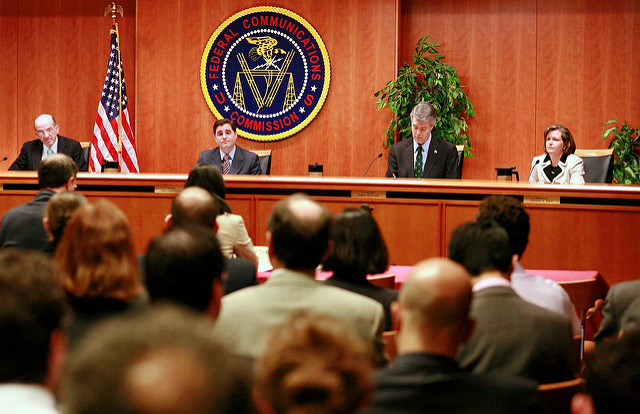Tag Archives: Online Privacy
Statement on California State Senate Advancing Dangerous Surveillance Bill

In the wake of the California State Senate’s passage of S.B. 690, the Consumer Federation of California, Electronic Frontier Foundation (EFF), TechEquity, Tech Oversight California, and ACLU California Action issued a joint statement warning that the bill would put the safety and privacy of millions of Californians at serious risk Read More ›
Salesforce Data Breach Suit Cites California Privacy Law
February 4, 2020. Daniel Stoller, Bloomberg Law – Salesforce.com Inc. and a children’s clothing company face data-breach allegations in a federal court lawsuit that is among the first to cite California’s landmark privacy law since it took effect Jan. 1. https://news.bloomberglaw.com/privacy-and-data-security/salesforce-data-breach-suit-cites-california-privacy-law
The Evil List. Which tech companies are really doing the most harm?
Slate.com Jan. 15, 2020 Slate.com Jan. 15, 2020 – Maybe it was fake news, Russian trolls, and Cambridge Analytica. Or Travis Kalanick’s conniption in an Uber. Or the unmasking of Theranos. Or all those Twitter Nazis, and racist Google results, and conspiracy theories on YouTube. https://slate.com/technology/2020/01/evil-list-tech-companies-dangerous-amazon-facebook-google-palantir.html?utm_source=pocket&utm_medium=email&utm_campaign=pockethits
FCC Adopts New Privacy Rule, Limits What ISPs Can Do With Your Data
by Kate Cox, The Consumerist

“Consumers should not have to be network engineers to understand who is collecting their data, and they should not have to be lawyers to understand if their information is protected. So it is incumbent upon every policy-maker with privacy authority to think about how to make our policies more simple and more consistent,” wrote Commissioner Jessica Rosenworcel. Read More ›
Companies Wary of WhatsApp Privacy Issues
by Claire Atkinson, New York Post

It’s not just privacy advocates who are freaking out over Facebook’s decision to extract user data from its popular WhatsApp messaging service. The controversial move may force business to explore other avenues beyond Facebook and WhatsApp as a way to connect with consumers more securely. Read More ›
Advocates Say Verizon-Yahoo Deal Shows Need For Privacy Rules
by David McCabe, The Hill

The acquisition — a sign of Verizon’s growing interest in the advertising business — comes as the Federal Communications Commission (FCC) moves toward a final vote on the hotly contested proposed rules, which would require internet providers to get permission before using their customers data for most advertising purposes. Read More ›
AB 2688: Health ‘Privacy’ Bill Would Unleash Information Sharing

6/28 update: AB 2688 was approved in the Senate Judiciary Committee today. Voting in favor of the bill – and against consumers’ interests – were all of the panel’s Democrats: Chair Hannah-Beth Jackson and Senators Robert Hertzberg, Mark Leno, William Monning and Bob Wieckowski. The committee’s two Republicans, Vice … Read More ›
Consumer Advocates Back FCC Proposal For Broadband Privacy Rules
by Rick Weber, Inside Cybersecurity

Consumer advocates are backing the general intention of a Federal Communications Commission proposal that would impose privacy requirements on Internet service providers. Read More ›
Virtual Assistants Such As Amazon’s Echo Break US Child Privacy Law, Experts Say
by Mark Harris, The Guardian

An investigation by the Guardian has found that despite Amazon marketing the Echo to families with young children, the device is likely to contravene the US Children’s Online Privacy Protection Act, set up to regulate the collection and use of personal information from anyone younger than 13. Read More ›
Why A Staggering Number Of Americans Have Stopped Using The Internet The Way They Used To
by Andrea Peterson, Washington Post

Nearly one in two Internet users say privacy and security concerns have now stopped them from doing basic things online — such as posting to social networks, expressing opinions in forums or even buying things from websites, according to a new government survey released Friday. … When asked to list their biggest concerns, nearly two out of three respondents cited identity theft, while nearly half brought up credit card or banking fraud. About one in five listed data collection by the government. Read More ›
EFF Sues For Release Of Data On Decryption Requests
by Cheryl Miller, Recorder, San Francisco

Digital liberties group Electronic Frontier Foundation sued the U.S. Department of Justice Tuesday for documents that may shed light on how many times—if ever—the federal government has sought a secret court order forcing companies to decrypt consumers’ information. … The not-for-profit, following up on media reports about the government trying to obtain private source code, [previously] filed a FOIA request with the DOJ’s National Security Division requesting any applications to FISC for court orders seeking “technical assistance” in unlocking data. Read More ›
CFC Applauds FCC Move To Protect Broadband Privacy
“Today’s vote is a significant advance for privacy protection. Consumers should decide whether their online activities and other personal data are shared with third-party strangers,” CFC Executive Director Richard Holober said. “It is essential that any final FCC rule prohibits broadband carriers from charging extra for privacy. Privacy is a right that should not be available only to the wealthy.” Read More ›
Broadband Industry: It’s Unfair If Facebook Can Collect Your Data, But AT&T Can’t
by Kate Cox, Consumerist

Later this week, the Federal Communications Commission will be voting on a proposal intended to protect some of your personal data from being shared by your Internet service provider, by requiring that the ISP first get your permission. … ISPs are the conduit for everything you do online, meaning they have access to a lot of potentially sensitive information about you … data about what sites you visit. When. For how long … Read More ›